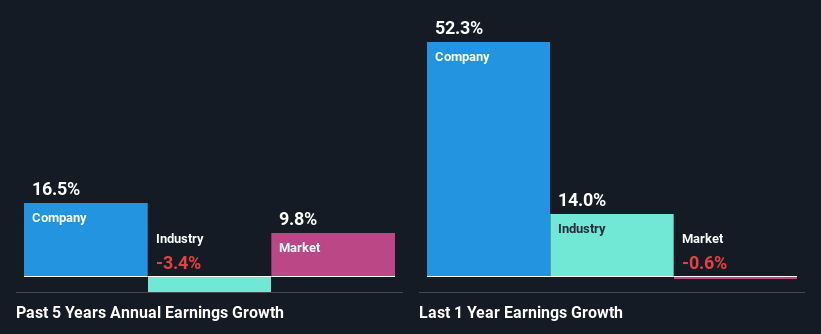- New Zealand
- /
- Renewable Energy
- /
- NZSE:MEL
Declining Stock and Decent Financials: Is The Market Wrong About Meridian Energy Limited (NZSE:MEL)?

It is hard to get excited after looking at Meridian Energy's (NZSE:MEL) recent performance, when its stock has declined 3.6% over the past month. However, the company's fundamentals look pretty decent, and long-term financials are usually aligned with future market price movements. Specifically, we decided to study Meridian Energy's ROE in this article.
Return on Equity or ROE is a test of how effectively a company is growing its value and managing investors’ money. In short, ROE shows the profit each dollar generates with respect to its shareholder investments.
View our latest analysis for Meridian Energy
How To Calculate Return On Equity?
The formula for ROE is:
Return on Equity = Net Profit (from continuing operations) ÷ Shareholders' Equity
So, based on the above formula, the ROE for Meridian Energy is:
8.5% = NZ$507m ÷ NZ$6.0b (Based on the trailing twelve months to December 2022).
The 'return' is the profit over the last twelve months. One way to conceptualize this is that for each NZ$1 of shareholders' capital it has, the company made NZ$0.08 in profit.
What Is The Relationship Between ROE And Earnings Growth?
So far, we've learned that ROE is a measure of a company's profitability. Depending on how much of these profits the company reinvests or "retains", and how effectively it does so, we are then able to assess a company’s earnings growth potential. Assuming everything else remains unchanged, the higher the ROE and profit retention, the higher the growth rate of a company compared to companies that don't necessarily bear these characteristics.
A Side By Side comparison of Meridian Energy's Earnings Growth And 8.5% ROE
At first glance, Meridian Energy's ROE doesn't look very promising. However, the fact that the company's ROE is higher than the average industry ROE of 1.3%, is definitely interesting. Consequently, this likely laid the ground for the decent growth of 17% seen over the past five years by Meridian Energy. Bear in mind, the company does have a moderately low ROE. It is just that the industry ROE is lower. Therefore, the growth in earnings could also be the result of other factors. For example, it is possible that the broader industry is going through a high growth phase, or that the company has a low payout ratio.
We then compared Meridian Energy's net income growth with the industry and we're pleased to see that the company's growth figure is higher when compared with the industry which has a growth rate of 13% in the same period.

Earnings growth is a huge factor in stock valuation. The investor should try to establish if the expected growth or decline in earnings, whichever the case may be, is priced in. By doing so, they will have an idea if the stock is headed into clear blue waters or if swampy waters await. If you're wondering about Meridian Energy's's valuation, check out this gauge of its price-to-earnings ratio, as compared to its industry.
Is Meridian Energy Efficiently Re-investing Its Profits?
Meridian Energy's high three-year median payout ratio of 124% suggests that the company is paying out more to its shareholders than what it is making. In spite of this, the company was able to grow its earnings respectably, as we saw above. Although, the high payout ratio is certainly something we would keep an eye on if the company is not able to keep up its growth, or if business deteriorates. Our risks dashboard should have the 2 risks we have identified for Meridian Energy.
Besides, Meridian Energy has been paying dividends over a period of eight years. This shows that the company is committed to sharing profits with its shareholders. Our latest analyst data shows that the future payout ratio of the company over the next three years is expected to be approximately 133%. However, Meridian Energy's future ROE is expected to decline to 6.7% despite there being not much change anticipated in the company's payout ratio.
Summary
In total, it does look like Meridian Energy has some positive aspects to its business. Especially the growth in earnings which was backed by a moderate ROE. Still, the ROE could have been even more beneficial to investors had the company been reinvesting more of its profits. As highlighted earlier, the current reinvestment rate appears to be negligible. Having said that, the company's earnings growth is expected to slow down, as forecasted in the current analyst estimates. To know more about the latest analysts predictions for the company, check out this visualization of analyst forecasts for the company.
New: Manage All Your Stock Portfolios in One Place
We've created the ultimate portfolio companion for stock investors, and it's free.
• Connect an unlimited number of Portfolios and see your total in one currency
• Be alerted to new Warning Signs or Risks via email or mobile
• Track the Fair Value of your stocks
Have feedback on this article? Concerned about the content? Get in touch with us directly. Alternatively, email editorial-team (at) simplywallst.com.
This article by Simply Wall St is general in nature. We provide commentary based on historical data and analyst forecasts only using an unbiased methodology and our articles are not intended to be financial advice. It does not constitute a recommendation to buy or sell any stock, and does not take account of your objectives, or your financial situation. We aim to bring you long-term focused analysis driven by fundamental data. Note that our analysis may not factor in the latest price-sensitive company announcements or qualitative material. Simply Wall St has no position in any stocks mentioned.
About NZSE:MEL
Meridian Energy
Engages in the generation, trading, and retailing of electricity to residential, business, and industrial customers in New Zealand, Australia, and the United Kingdom.
Proven track record with adequate balance sheet.
Similar Companies
Market Insights
Community Narratives




